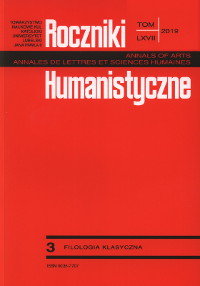Heraklit w interpretacji Elzenberga. Cz. I: Jakich błędów autor Kłopotu z istnieniem uniknąłby z łatwością, gdyby tylko nad antologię Dielsa przedkładał źródła i bardziej ufał im i sobie?
Heraclitus in Elzenberg’s Interpretation. Part I: What Mistakes Could the Author of The Trouble with Existence Have Easily Avoided, if only He Had Valued the Sources more than Diels’ Collection and Trusted Them and Himself more?
Author(s): Wojciech WrotkowskiSubject(s): Philosophy, History of Philosophy, Ancient Philosphy
Published by: Towarzystwo Naukowe KUL & Katolicki Uniwersytet Lubelski Jana Pawła II
Keywords: ancient philosophy; presocratics; translation; interpretation of sources; Heraclitus; Diels; Elzenberg
Summary/Abstract: The article contains a philological and philosophical verification of a „sketch of a translation” of the fragments of the book of Heraclitus of Ephesus, which Henryk Elzenberg made before the year 1921. Elzenberg did not base his own attempt to translate maxims of the Ephesian sage on their sources, but on the third edition of the collection Die Fragmente der Vorsokratiker (19123) compiled by Hermann Diels, who had four times edited and variously translated excerpts from the original passages.In order to best evaluate and verify Elzenberg’s „sketch of a translation”, the author has quoted – in succession – (1) the Greek sources, (2) his own translations of them, (3) Diels’ versions of the Greek texts of the Ephesian’s fragments analyzed here, (4) Diels’ German translations of them and – against all of these – (5) Elzenberg’s attempts at translation.The methodology used in the article has facilitated the formulation of a conclusion that although the young Elzenberg was faithful to his own principle of reading nothing whatsoever „meekly” – without overlooking the translations of the German philologist – nevertheless, on strictly philological grounds, he unwittingly fell victim to Diels’ „helplessness”, because in fact nothing in his „sketch of a translation” of Heraclitus’ aphorisms provides evidence that (1) he discovered – or at least presaged – any „connection” (Zusammenhang) between them, or that (2) he formulated on the basis thereof any philosophical conclusions, reflecting the Ephesian’s thought. The best proof of this emerges from a comparison of fragment B67 with maxim B53 based on the sources and the translations.
Journal: Roczniki Humanistyczne
- Issue Year: 67/2019
- Issue No: 3
- Page Range: 125-148
- Page Count: 24
- Language: Polish

